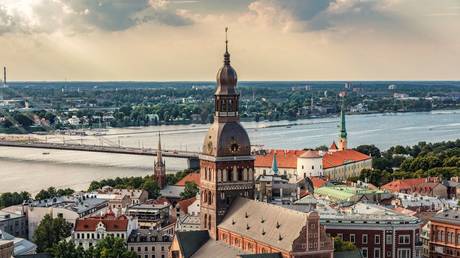Will Woke Capital Soon Go the Way of the Dinosaur?
4,149 words
In recent times, Woke Capital has become increasingly aggressive. The results included strange virtue-signaling the likes of which would have been unimaginable until not long ago. How much can the Limousine Leftists rub our noses in their bizarre values before customers refuse to put up with it? As the proverb goes, “Get woke, go broke.” More to the point, how long will it take for the corporations to learn the lesson?
Although big business can’t send anyone to the gulag, their embrace of the Loony Left should be concerning. Even if one were to ignore the fact that plutocrats pull major strings in the government — it’s hardly an exaggeration to think of the Deep State as a white-collar mafia — businesses collectively wield a tremendous amount of soft power. That can set the tone for the culture, as Sam Francis observed. Moreover, although corporations don’t have military forces (except when they borrow ours) or police, they have other ways they can be capricious and tyrannical.
Monopoly capitalism has lately been abusing individuals by depriving workers of their livelihoods, shutting down participation in the marketplace of ideas in cyberspace, conducting digital book burnings, restricting access to online payment processors, and even closing bank accounts, all if they don’t like someone’s politics. A constellation of corporations called the mainstream media serves as The System’s propaganda arm. It’s time to do away with the silly libertarian notion that private enterprise is a domain of freedom. Moreover, the once commonplace notion that big business and big government are in opposition to one another is no longer tenable. In fact, the worst is when the government, monopoly capitalism, and Leftist activist foundations are in bed together.
Woke Capital’s motivations
Politicization of businesses is nothing new, but the degree of it has increased tremendously in recent times. Injecting Leftism into corporations might be tolerable — barely –to a modest extent. Ideological balance would help, too, with at least a few Right-leaning companies to even things out. (Once upon a time, there used to be a libertarian/objectivist inclination in high tech. That seems to have disappeared, with Left Coast values now hegemonic over cyberspace thanks to the Tech Tyrants in the buckle of the Granola Belt.) The great majority of companies should be politically neutral, which is quite proper for a business. All told, there would be something for everyone, and Adam Smith’s “Invisible Hand” would correct any excesses.
When it seems apparent that 99.5% of all major corporations are singing from the same hymnal in the Woke Death Cult, then business becomes yet another institution delivering full-spectrum ideological saturation. A Neoreactionary analysis of the phenomenon found only one company listed in the Dow Jones and S&P 500 indices that didn’t virtue-signal in some way. It’s quite a stunning picture of conformity. The 99.5% figure thus may indeed be accurate rather than hyperbole, unless they missed something:
The comparatively subtle “we embrace diversity and inclusion” crap is actually more dangerous than the outrage generating calculated PR “gaffe”. It’s a matter of boiling the frog vs sautéing it, though both ultimately move the Overton window left. And this is the point I try to get across. In fact, when I first started, I tried to find woke tweets from every company on the Dow and S&P 500 I could think of. Name a company, I’ll show you Cathedral propaganda. To date, I know only ONE publicly traded company where I couldn’t find any woke signaling whatsoever. I’m not going to reveal which company, as I wouldn’t want to bring the Eye of Soros down upon them.
The analysis also looked into the motives of companies to embrace this type of politicization. In brief:
- True believers: Key figures who are committed to Leftist ideology and integrate it into corporate culture.
- Havel’s greengrocers: Politicization used as a perfunctory display of allegiance to the dominant ideology, though without genuine enthusiasm, being done primarily to allay any suspicion that they dissent.
- Cynical opportunists: Virtue-signaling is regarded purely as a marketing strategy used to attract certain types of customers, estimating that it will be a net benefit.
It’s overall a solid analysis. The following discusses how the corporate mentality along with external pressure encouraged all this.
The corporate mentality
The business world sometimes gets weird. Since the 1990s, and perhaps going back much further, strange fads came and went. For instance, a hair-raisingly unlovely style of jargon became popular. Then elaborate mission statements written in this gobbledygook became trendy. After that it was naming software “Turbo-Something,” and then there was the “trust” game and other oddball stuff they’d do such as “team builders” (which was itself a fad that endured), the ISO-9000 cult, soon after that the Six Sigma cult, Agile/Scrum software development, the ugly Windows 8 logo’s minimalist aesthetic — the list goes on.
As soon as these things begin to pop up in one place, it soon it spreads like wildfire, until (in most cases) it falls out of fashion. Phenomena like this were endless fodder for parodies of workplace culture such as Dilbert and Office Space. But in this case, there’s no intentional transmission belt to keep everyone following a Party Line. Instead, such fads spread like memes, revealing a peculiar bovine hive-mind among the geniuses inhabiting the stratospheric layers of upper management.
Corporate executives are odd creatures in some ways, and rather predictable in certain regards. They do share some common traits. (The foremost is that they’re madly in love with themselves.) Apart from that, they’re good with business, and they surely know their industry well. But that’s no guarantee that they understand every facet of the company in detail. Likewise, contrary to the opinion of some of them, having a lot of money doesn’t mean that they’re competent to meddle in government, much less that they are uniquely qualified to run the world.
But despite the fact that they’re not always as smart as they think they are, executives can nevertheless recognize certain gaps in knowledge. They frequently consult experts as needed; it’s part of the job. Unlike Henry Ford, automotive CEOs don’t have to know how an engine works, or how to put together an assembly line; they hire people do those things. Other than that, executives might have to work with attorneys, accountants, regulatory compliance specialists, engineers, the tech people, payroll, advertising, human resources, and so forth. These might come in the form of outside consultants, hired as needed, or internal departments.
Proverbially, if the only tool in one’s toolbox is a hammer, then all problems begin to look like nails. Acting on advice by consultants often ends in cutting a check — something else corporate executives do quite frequently. They don’t necessarily do much deep analysis into where the money goes. After all, they’re relying on their experts to give their informed, professional opinions.
How the Woke Capital problem developed
Some businesses were early adopters of Leftist ideology and meant it. In the terms outlined above, they’d be “True Believers.” Later on, other corporations began to buy into these trends. Eventually, even previously apolitical companies came to see Leftist gestures as another of the routine tasks that “had to be done,” and as another facet of the business requiring an exotic skillset, not unlike regulatory compliance or maintaining a website. This started becoming a lot more noticeable during the Obama administration, with the bovine hive-mind driving the herd leftward.

You can buy Beau Albrecht’s Space Vixen Trek here.
Soon enough everyone was doing it, mainly to signal their bona fides and ward off trouble. These are the “Havel’s greengrocers,” named after a hypothetical Czechoslovak citizen who posted a Communist motto on his storefront, hoping to make sure that he was staying on the government’s good side. Then there were the “cynical opportunists” who considered woke gestures to be a marketing gimmick to win brownie points with certain consumer blocs.
What was an executive to do to put the pieces together when all this became trendy? They did what they’ve always done: consult with experts and write a check. (If voodoo were to become the next corporate fad, a trendy CEO would bring in houngans from Haiti to the next Board meeting, twitching and babbling while in a spirit-channeling trance and sacrificing a goat in the conference room. After that he will buy a truckload of sigils and idols to consecrate the office to the voodoo pantheon’s Orishas and other archons.) Common specimens of experts in Leftist ideology include skintellectuals, diversity mystagogues, sociology graduates with the ink barely dry on their diplomas, empowered feminists with chips on their shoulders that are longer than their dildos, and squidlings with facial piercings aligned to receive transmissions from their home planet of Epsilon Eridani. The good news is that no goat sacrifices are involved; even chickens can get pretty messy.
Leftist social politics became another corporate fad somewhere along the way. (Leftist economic politics would be out of the question, of course. Paying reasonable wages to the people who actually get things done? Costs money! Nuh-uh! If pollution or horrible factory conditions cause bad public relations, shipping the jobs to the Third World is cheaper than fixing it; out of sight, out of mind, right? Labor unions? Perish the thought! If necessary, illegal alien scabs can be brought in who won’t complain so much.) Once upon a time, Leftists used to regard corporations with deep mistrust. They’re all greedy exploiters and capitalist running dogs, aren’t they? Then someone figured out that Leftists could be placated inexpensively with symbolic gestures such as virtue signaling.
Interestingly, the notable hyper-capitalist Ayn Rand sounded a distant early warning about corporate political compliance in 1957’s Atlas Shrugged. In that book, Leftist gestures — far less loathsome than what we see nowadays, but bad enough — and lobbying became merely others among the routine tasks that “had to be done”; another facet of the business requiring an exotic skillset. The book had plenty to say about the types who fit the bill! Just for starters, the protagonist contemplates her brother’s rise to power as a CEO, backed by the Board of Directors:
They talked about his gift of “making railroads popular,” his “good press,” his “Washington ability.” He seemed unusually skillful at obtaining favors from Legislature.
Dagny knew nothing about the field of “Washington ability” or what such an ability implied. But it seemed to be necessary, so she dismissed it with the thought that there were many kinds of work which were offensive, yet necessary, such as cleaning sewers; somebody had to do it, and Jim seemed to like it.
Unfortunately, the only things he was good at were schmoozing and claiming credit for his sister’s making the trains run on time. Otherwise, he was a complete bungler. Dagny’s boyfriend would soon face similar problems at his company:
Wesley Mouch, his Washington man, had told Rearden not to worry; the fight would be stiff, he had said, but the bill would be defeated.
Rearden understood nothing about that kind of a fight. He left it to Mouch and his staff. He could barely find the time to skim through the reports from Washington and to sign the checks which Mouch requested for the battle.
In the book, steel magnate Hank Rearden doesn’t get to his position by playing boardroom musical chairs. Rather, much like Henry Ford (another Hank!), he did his own research, built the company, and understood production. As for lobbying, though, Rearden had to hire a team of “experts” to look after the political front. Other than cutting checks, he paid little attention to these whiz kids and what they were up to in Washington. True to his type, one of them, Wesley Mouch, later bit the hand that was feeding him in a big way.
Where things went wrong

Courtesy of Stonetoss
So what happens when a corporation brings in anti-white grifters as consultants, or hires a batch of snowflakes fresh out of college who acquired a Chairman Mao complex thanks to Professor Dorkheimer’s indoctrination? One major effect was piggybacking political propaganda on commercial propaganda (better known as advertising). Rather infamously, there are those ads pushing race-mixing thanks to those advertising agency executives who besmirch the honor of their noble Hebrew ancestors. This has become so prevalent that it’s clearly not about selling more products; it’s to encourage Rassenschande.
That’s obviously a tremendously reckless thing to do with a company’s advertising budget. Commercials are meant to entice customers, but race-mixing disgusts normal people, and everyone knows that. It makes my eyes bleed even worse than the kissyface scenes in Brokeback Mountain. After seeing ads like that from certain companies, I’ve chosen to take my business elsewhere. This happened again quite recently: I was contemplating a big-ticket vacation package, but after their advertising department rubbed my nose in miscegenation, they could forget about getting my money. (I’ll take my 2,000 bucks and buy a week’s groceries instead.) Surely I’m not the only one who feels the same way. Insulting customers is terrible for business.
There’s something else far less noxious by orders of magnitude, but still quite curious: Why is it that when I check my retirement fund, the brokerage website shows nothing but black couples in their banner ads? Since they’re not race-mixers, it’s refreshingly normal, but still rather out of place. Did the company move its headquarters to Nairobi or Lagos? Are blacks their major customers? If banner ads for a high-finance website featured long-nosed guys in beanies with yentas wearing snoods, it would seem far more natural. That much I’d understand.
Racial agitation isn’t the only angle in politicized advertising, of course. There are other flavors in the cultural Marxism buffet as well. Likewise, there were a fair number of advertisements piggybacking feminism on commercial propaganda. The radical LGBTs got their licks in as well, of course.
To name one item, there was that horrible Gillette ad that ran during the 2019 Super Bowl. What were those people thinking to insult their customers like that? Putting that trash on the air was remarkably expensive, but merely a drop in the bucket compared to losing $8 billion. That’s quite a lot of lettuce, even by the standards of a large corporation. It seems a stretch to believe that this fiscal nosedive had nothing to do with former customers who were disgusted by the stunt. Did Gillette apologize, or at least try to back away from the abyss a teensy bit? As it happens, their head honcho defended the decision to run it in a style of reasoning evocative of both the “true believer” and “cynical opportunist” positions.
The problem with all this wonderfulness is that the money a company loses from their horribly tone-deaf stunts doesn’t belong to the CEO, much less the blue-haired terrestrial calamari in the advertising department; rather, it was entrusted to the company by their shareholders. This should’ve been the moment when Big Business discovered the adage “Get woke, go broke.” Unfortunately, they didn’t. Again, top executives seem to share a bovine hive-mind, and perhaps it’s difficult to reconsider when 99.5% of corporations are doing token genuflections at minimum.

You can buy Tito Perdue’s novel The Node, here.
The moment after the Obergefell v. Hodges ruling discovered a new right in the Constitution that would have astonished its authors, the transgender fad took center stage. Whether one regards the phenomenon as a timely civil rights cause, a fashionable sexual fetish, or a politically-correct mass hysteria, it’s certainly been influential beyond what anyone could have anticipated. When businesses play along with this, it’s not about “inclusion”; it’s to make a statement.
When a women’s magazine nominated Caitlyn — formerly Bruce — Jenner as Woman of the Year, it was to proclaim to their readers that men can become women, and even do better at being women. Given the feminist catchphrase that “a woman can do anything a man can, but better,” this is a curious inversion! Astonishingly, Playboy ran a photoshoot of a ladyboy barely a moment after their founder Hugh Hefner began to assume room temperature. (It’s unlikely that this was as big of a seller at the newsstands as their Pamela Anderson editions.) Obviously this was meant to show that men should desire ladyboys. If the catchphrase which holds that “trans women are women” is true, then there would be hardly any need to showcase them. Spotlighting them conspicuously like this actually goes beyond the primary assertion; it’s as if to say that trans women are better than women. The chutzpah is unreal.
Have there been any Rightist corporations who attempted to balance the picture? The last gasp of that seems to have been Chick‑Fil‑A, during its 2012 controversy. Much unlike Woke Capital’s gaffes, customers reacted quite favorably. Mike Huckabee, one of the country’s better politicians, even called for a Chick‑Fil‑A Appreciation Day. When the date rolled around, they experienced a major surge in business. I recall driving by one location and saw customers enduring the heat in a long line that stretched out the door. After that the company officially became politically neutral, succumbing to pressure from those noisy Leftists.
Then, the deluge
In the annus horribilis of 2020, things got remarkably worse. In the wake of the Fauci Flu plandemic, the W6rld Ec6onomic F6rum’s “Gr6at R6s6t” made some new management fads popular. There was “stakeholder capitalism,” whatever the hell that’s supposed to mean, as well as phony corporate-friendly environmentalism. Some other fads bubbled up as well: critical race theory (CRT); environmental, social, and governance ratings (ESG); and diversity, inclusion, and equality (DIE). Gigantic portfolio management companies were becoming the crowbar for enforcing globalism, neoliberalism, and the cultural Marxist flavor of the month — not that big business ever was making valiant efforts to resist in the first place.
Then it got worse. In Minneapolis, a career criminal overdosing on fentanyl suffered a coronary while in police custody. As the media machine went into overdrive to fan the flames, and turned this Darwin Award laureate into the next “civil rights” martyr, and suddenly big companies around the country felt the need to make official indignant pronouncements about the matter, posting them on their websites and mass-mailing their customers. (I’ve stopped doing business with those that issued openly anti-white statements.) That was hardly the end of it, of course — because the criminal was black and the officers weren’t, it ignited three months of “mostly peaceful” rioting all across the country.
When mobs were routinely looting and burning businesses, and all too many Leftist municipal authorities were looking the other way — or worse, ordering the police to kneel to these wonderful people — what was a CEO to do? As always, their answer was to ask for advice and cut a check. In the most extravagant example, one major bank handed over a cool billion to Black Lives Matter. Other major corporations gave millions, tens of millions, and in some cases even a hundred million.
Was it a heartfelt show of solidarity, or were they just hoping their stores wouldn’t get plundered and torched? Whatever high-minded motives someone might ascribe it in terms of phony Leftist virtue, underneath it smelled like a massive payoff. This was neither the right thing to do, nor prudent. Submitting to a shakedown will guarantee future shakedowns — although at the time, it surely seemed the path of least resistance to all those executives who reached for their checkbooks. I should add that intimidation can’t be the only factor, since several of those who caved in operate mostly or completely online, and their property was thus in little danger. They were simply idiots who channeled massive amounts of money into anti-white agitation.
Amidst all that, there was a massive wave of rhetoric blaming whites for everything wrong with the world — some of the foulest seen since the 1960s. It’s as if every two-bit talking head was competing to see who could slag off whites the loudest. Of course, the mainstream media signal-boosted it. The next act was a wave of vandalism against monuments, again with municipal authorities looking the other way. What did the suits in the boardrooms make of all the chaos going on? Suddenly, this CRT/ESG/DIE stuff seemed less like a management fad and more of a necessity. One way of looking at it was as a new necessity similar to having a regulatory compliance department, except in this case it was political compliance.
Surely those days were a bonanza for those diversity mystagogues who were called in to deliver presentations to captive audiences of corporate employees. Although human resources departments had already assumed political compliance before that point, the bovine hive-mind was coming up with the next move. Many companies decided that standalone DIE departments were the next necessity. These turned out to be make-work programs for the usual sort of Leftists who emerged from college with their brains pickled in propaganda. There seemed to be no end of it, despite some early warnings that things were going too far.

There may now be a turning point at hand. The good news is that it may be possible that the post-2020 anti-white rhetoric has already peaked. There are some small but encouraging signs of this. I’m cautiously optimistic.
More good news is that businesses have nothing that the public does not give them. (Even those subsidized by the government still get the public’s money, even if indirectly.) If customers vote with their wallets and reject companies that don’t deserve our support, they dry up and blow away. This is similar to the Randian concept of the sanction of evil: the bad guys can’t win unless other people cooperate with them. It’s rather ironic, since Ayn Rand’s beloved big businesses are now the very institutions that are misbehaving.

You can buy Charles Krafft’s An Artist of the Right here.
Will we find our voice at last? Will the Sleeping Giant finally awaken? Time will tell.
For now, there are some signs that the DIE fad might be wearing off. In the cases of at least some companies, all those political compliance departments are starting to look like dead weight under more sober analysis. I suspect their DIE staffers might not be making a very favorable impression. That would hardly be a surprise, since the usual types who take such jobs are nitwits with little experience of the real world, yet are confident that they know exactly how it should be run. Since an in-house DIE department doesn’t actually do anything productive, and would have to continually make itself look important to justify its continued existence. More likely than not, it would end up looking like a roomful of armchair Lenins who are drawing salaries while issuing increasingly bizarre statements and haughty diktats, all having little or nothing to do with the company’s actual business. Moreover, resistance is building.
With luck, the recent Bud Light imbroglio might turn out to be the Waterloo moment for Woke Capital. This event is one of the occasions that a corporation shot itself in the foot with a badly-considered advertising stunt. Their April partnership with a transgendered minor celebrity went horribly awry. Budweiser’s customers tend to be blue-collar types, and were especially put off by that. It’s hardly unprecedented for cute women to appear on bottles — buxom beer-hall waitresses carrying mugs of suds are practically an icon of Bavaria and its beer-loving culture. On the other hand, men generally don’t like being told that they should find gender-benders desirable, and likewise there’s not much for women to love about a female impersonator being put in the spotlight.
All told, it was as nonsensical as if the “True Believer” ice cream company Ben & Jerry’s were to start producing Pinochet Pistachio and Mussolini Maraschino. Their Left-leaning customers would never forgive them. But Ben & Jerry’s certainly understands that irritating one’s clientele just doesn’t work.
At the time of writing, Anheuser-Busch’s stock is still in freefall after six weeks. Shelves of Budweiser go unsold. They literally can’t even give it away for free, and sarcastic references to “Butt Light” have appeared. Now they’re trying to counteract this with another gesture: producing bottles with camo designs. Unfortunately for them, they’ve already shot themselves in the foot, and a glaringly obvious effort at damage control won’t change things. They’d do better with a heartfelt apology for rubbing the noses of their customers in excrement.
This time the blowback is getting a lot more publicity than Gillette’s snotty feminist advertisement did. Target also received a major black eye, in this case over LGBT-themed children’s clothing, including chest binders for girls and “tuck friendly” swimsuits. (“Tucking” is what Buffalo Bill does during his weird dance scene in The Silence of the Lambs.) Disney and Kohl’s are also drawing heat. Will the business world finally learn the “Get woke, go broke” lesson and go back to selling products without the artificial political additives that are unwanted by customers and leave a bad taste in their mouths? Hopefully they’ll get a clue at last. Again, only time will tell.
* * *
Like all journals of dissident ideas, Counter-Currents depends on the support of readers like you. Help us compete with the censors of the Left and the violent accelerationists of the Right with a donation today. (The easiest way to help is with an e-check donation. All you need is your checkbook.)
For other ways to donate, click here.



